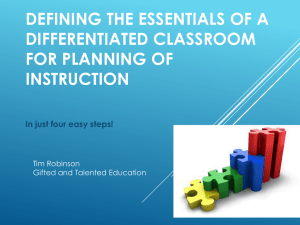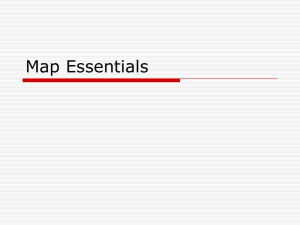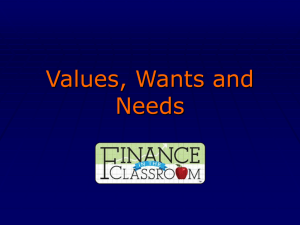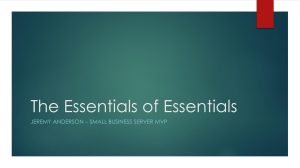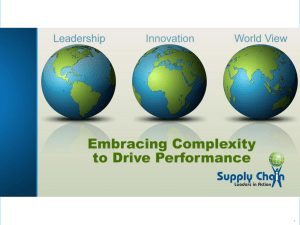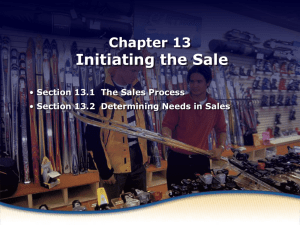Communication Essentials
advertisement
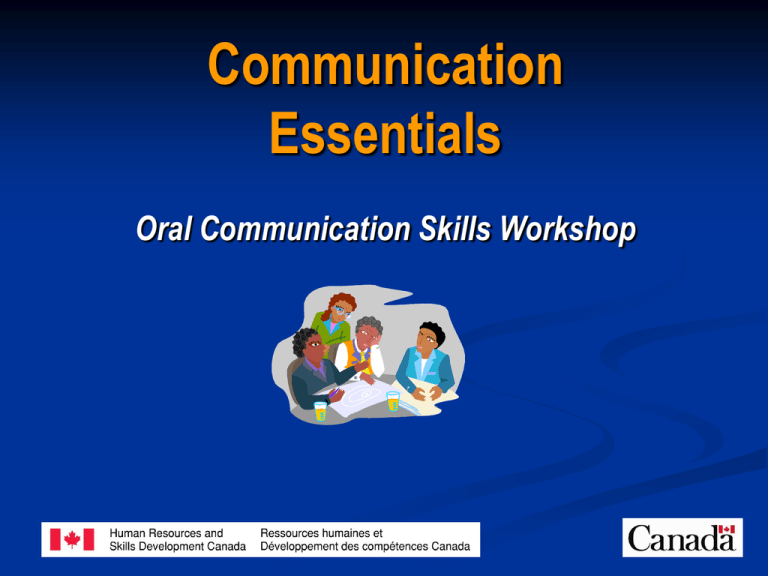
Communication Essentials Oral Communication Skills Workshop What is Communication? A process by which information is exchanged between individuals through a common system of symbols, signs or behaviour. ~ Merriam Webster Online ~ 2 Communication Essentials Workshop 2008 What is Oral Communication? Oral Communication is the use of speech to give and exchange thoughts and information. ~ Essential Skills Reader’s Guide, hrsdc.gc.ca/essentialskills ~ 3 Communication Essentials Workshop 2008 Oral Communication – One of Nine Essential Skills 4 Reading Text Document Use Numeracy Writing Oral Communication Working with Others Thinking Computer Use Continuous Learning Communication Essentials Workshop 2008 Oral Communication – An Essential Skill Typical Applications: Greeting people Taking messages Reassuring, comforting, persuading Seeking or obtaining information Resolving conflicts Facilitating or leading a group 5 Communication Essentials Workshop 2008 Oral Communication – An Essential Skill 6 Oral Communication has four levels of complexity. The levels increase in difficulty from basic (level 1) to more advanced tasks (level 4). Communication Essentials Workshop 2008 True or False? 1. Communication happens mostly through words. 7 Communication Essentials Workshop 2008 True or False? 2. Effective communicators listen more than they speak. 8 Communication Essentials Workshop 2008 True or False? 3. Most people are already effective communicators. 9 Communication Essentials Workshop 2008 Why study Communication? Effective communication is one of the key foundations of any successful workplace. ~ Warren Sheppell ~ Relationships are the building blocks of organizations. ~ Margaret Wheatley ~ 10 Communication Essentials Workshop 2008 Why study Communication? According to Warren Sheppell, studies show that good communication helps people to: Receive and share information better Define and understand goals Build rapport Promote self-confidence Avoid negative effects of conflict and confusion 11 Communication Essentials Workshop 2008 Who needs Communication skills? If you do one of these, you need strong communication skills: Own your own business Work as part of an organization/team Interact with others on a regular basis for work or personal reasons 12 Communication Essentials Workshop 2008 Did you know? It is estimated that 70% of workplace errors happen because of communication breakdowns. ~ Denise Bissonnette ~ 13 Communication Essentials Workshop 2008 Did you know? Albert Mehrabian’s model for spoken communication indicates that: 7% of meaning is in the words that are spoken 38% of meaning is in the way words are said 55% of meaning is in the facial expression 14 Communication Essentials Workshop 2008 Communication Loop Send Receive Person A Person B Receive 15 Send Communication Essentials Workshop 2008 Communication Loop Discussion Questions 1. 2. 3. 16 How does the sender know whether the message was received? Why and when does miscommunication occur? What affects how we send and receive messages? Communication Essentials Workshop 2008 Communication Loop We have 100% control over how we send and receive messages on our side of the communication loop. 17 Communication Essentials Workshop 2008 Food for Thought We don’t see things as they are, we see things as we are. ~ Anais Nin ~ 18 Communication Essentials Workshop 2008 “The Way It Is” Model 19 Communication Essentials Workshop 2008 The Four Ps Four Elements of Successful Communication Purpose Preparation Patience Persistence 20 Communication Essentials Workshop 2008 Things That Help Communication 21 Using “I” statements Admitting problems on both sides Thinking positively Seeking to understand views of others Striving to achieve a “win-win” scenario Being willing to compromise Being authentic, honest and open Communication Essentials Workshop 2008 Things That Hinder Communication 22 Having a defensive attitude Talking too much Assigning blame Judging Making assumptions Being disrespectful towards others Communication Essentials Workshop 2008 Group Communication As the number of people in a group increases, the communication process becomes more complex. Two-way Communication between two people: 23 Communication Essentials Workshop 2008 Group Communication Two-way Communication between three people: 24 Communication Essentials Workshop 2008 Group Communication 25 Two-way Communication between four people: Communication Essentials Workshop 2008 Five Principles of Effective Communication 1. Treat each relationship with care 26 Relationships are the building blocks of organizations Productive relationships encourage positive growth, individually and collectively Each relationship is an opportunity for growth and learning Communication Essentials Workshop 2008 Five Principles of Effective Communication 2. Think win/win 27 Try to find a solution that satisfies everyone Try to find ways to co-operate creatively Treat each other equally Communication Essentials Workshop 2008 Five Principles of Effective Communication 3. Respect others’ points of view 28 Validate the way others feel, think or react Let the other person vent Know that it is okay to disagree Accept that each person has a unique viewpoint Accept that other people are entitled to being who they are Communication Essentials Workshop 2008 Five Principles of Effective Communication 4. Seek first to understand rather than to be understood 29 Truly listen to others Ask open-ended questions Avoid interrupting Avoid putting words into the other person’s mouth Communication Essentials Workshop 2008 Five Principles of Effective Communication 5. Be honest and open 30 Be open to the opinions and views of others State your views clearly by using “I” statements Face the speaker and maintain eye contact Make sure that your body language is consistent with your words Communication Essentials Workshop 2008 Culture and Communication 31 Culture affects the way in which people view life Cultural background may define both verbal and non-verbal communication Cultural differences may cause communication challenges Communication Essentials Workshop 2008 Culture and Communication Our cultural background influences our Values Beliefs Motivations Goals Assumptions 32 Communication Essentials Workshop 2008 Culture and Communication Culture may be defined by: 33 Ethnicity Gender Sexual Orientation Age Language Religion Profession Place of work Et cetera Communication Essentials Workshop 2008 Culture and Communication Tips for Effective Cross-Cultural Communication 34 Accept others’ views, even if they differ from yours Be patient with non-native speakers Recognize that differences exist Avoid judging, stereotyping or discriminating Avoid forcing your own cultural beliefs onto others Communication Essentials Workshop 2008 Communication Tips 35 Organize your thoughts and ideas before speaking Don’t interrupt when someone else is speaking Listen attentively—Take notes to help you remember Ask questions to clarify Keep an open mind to others’ ideas Communication Essentials Workshop 2008
